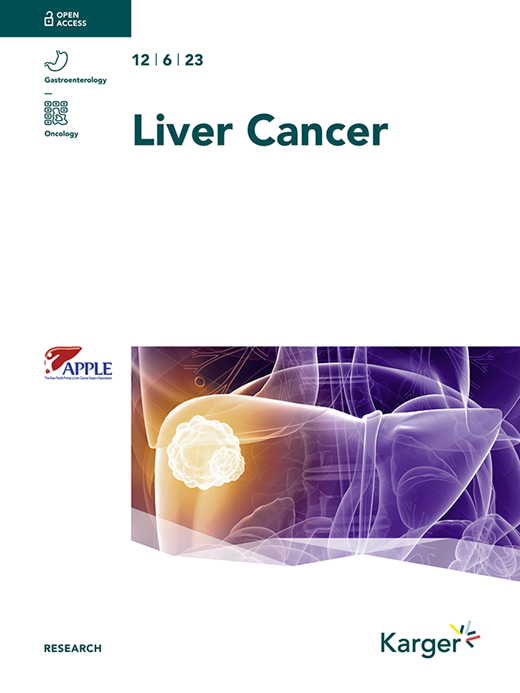评估晚期肝细胞癌患者术前伦伐替尼治疗有效性和安全性的多中心2期试验(LENS-HCC试验)
IF 9.1
1区 医学
Q1 GASTROENTEROLOGY & HEPATOLOGY
引用次数: 0
摘要
简介III期REFLECT试验表明,在不可切除肝细胞癌(HCC)患者的无进展生存期(PFS)、进展时间和客观反应率(ORR)方面,来伐替尼优于索拉非尼。本研究评估了来伐替尼术前治疗肿瘤学或技术上无法切除的HCC患者的有效性和安全性。研究方法在这项多中心单臂II期试验中,研究人员招募了晚期HCC患者和预后不良的提示因素(大血管侵犯、肝外转移或多结节肿瘤)患者。具有这些因素的患者,即使在技术上可切除HCC,也被定义为肿瘤学上不可切除的患者,因为预计术后预后较差。来伐替尼治疗8周后,对患者的可切除性进行评估,如果认为肿瘤在技术上可切除,则进行肿瘤切除。主要终点是手术切除率。次要终点为大体治愈切除率、总生存期(OS)、ORR、PFS以及来伐替尼治疗前后15分钟吲哚青绿保留率的变化。该试验已在日本临床试验注册中心注册(S031190057)。试验结果2019年7月至2021年1月期间,来自11个中心的49名患者(42名肿瘤无法切除的患者和7名技术无法切除的患者)入组。基于 mRECIST 的 ORR 为 37.5%,基于 RECIST 1.1 版的 ORR 为 12.5%。33名患者接受了手术(手术切除率:67.3%),无围手术期死亡。肿瘤学上无法切除的患者手术切除率为76.2%,技术上无法切除的患者手术切除率为14.3%。1年的OS率和中位PFS分别为75.9%和7.2个月,中位随访期为9.3个月。结论:手术切除率相对较高:本研究中相对较高的手术切除率表明,对于肿瘤学或技术上无法切除的HCC患者,来伐替尼治疗后再进行手术切除是安全可行的。本文章由计算机程序翻译,如有差异,请以英文原文为准。
A Multicenter Phase 2 Trial Evaluating the Efficacy and Safety of Preoperative Lenvatinib Therapy for Patients with Advanced Hepatocellular Carcinoma (LENS-HCC Trial)
Introduction: The phase III REFLECT trial demonstrated that lenvatinib was superior to sorafenib in terms of progression-free survival (PFS), time to progression, and objective response rate (ORR) for patients with unresectable hepatocellular carcinoma (HCC). This study assessed the efficacy and safety of preoperative lenvatinib therapy for patients with oncologically or technically unresectable HCC. Methods: In this multicenter single-arm phase II trial, patients with advanced HCC and factors suggestive of a poor prognosis (macroscopic vascular invasion, extrahepatic metastasis, or multinodular tumors) were enrolled. Patients with these factors, even with technically resectable HCC, were defined as oncologically unresectable because of the expected poor prognosis after surgery. After 8 weeks of lenvatinib therapy, the patients were assessed for resectability, and tumor resection was performed if the tumor was considered technically resectable. The primary endpoint was the surgical resection rate. The secondary endpoints were the macroscopic curative resection rate, overall survival (OS), ORR, PFS, and the change in the indocyanine green retention rate at 15 minutes as measured before and after lenvatinib therapy. The trial was registered with the Japan Registry of Clinical Trials (s031190057). Results: Between July 2019 and January 2021, 49 patients (42 oncologically unresectable patients and 7 technically unresectable patients) from 11 centers were enrolled. The ORR was 37.5% based on mRECIST and 12.5% based on RECIST version 1.1. Thirty-three patients underwent surgery (surgical resection rate: 67.3%) without perioperative mortality. The surgical resection rate was 76.2% for oncologically unresectable patients and 14.3% for technically unresectable patients. The 1-year OS rate and median PFS were 75.9% and 7.2 months, respectively, with a median follow-up period of 9.3 months. Conclusions: The relatively high surgical resection rate seen in this study suggests the safety and feasibility of lenvatinib therapy followed by surgical resection for patients with oncologically or technically unresectable HCC.
求助全文
通过发布文献求助,成功后即可免费获取论文全文。
去求助
来源期刊

Liver Cancer
Medicine-Oncology
CiteScore
20.80
自引率
7.20%
发文量
53
审稿时长
16 weeks
期刊介绍:
Liver Cancer is a journal that serves the international community of researchers and clinicians by providing a platform for research results related to the causes, mechanisms, and therapy of liver cancer. It focuses on molecular carcinogenesis, prevention, surveillance, diagnosis, and treatment, including molecular targeted therapy. The journal publishes clinical and translational research in the field of liver cancer in both humans and experimental models. It publishes original and review articles and has an Impact Factor of 13.8. The journal is indexed and abstracted in various platforms including PubMed, PubMed Central, Web of Science, Science Citation Index, Science Citation Index Expanded, Google Scholar, DOAJ, Chemical Abstracts Service, Scopus, Embase, Pathway Studio, and WorldCat.
 求助内容:
求助内容: 应助结果提醒方式:
应助结果提醒方式:


